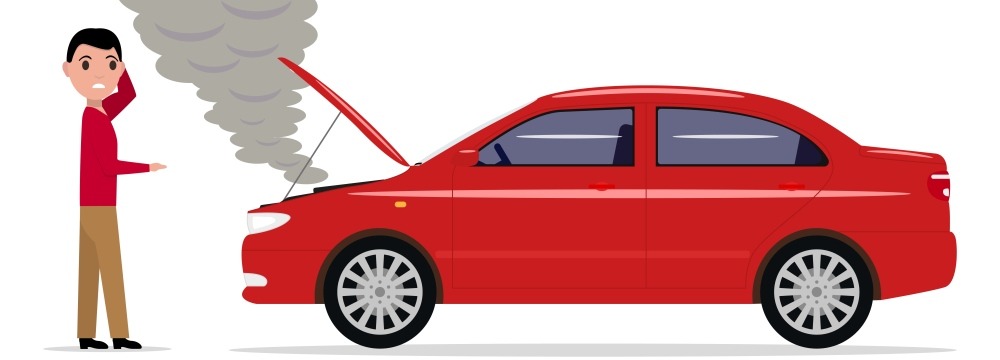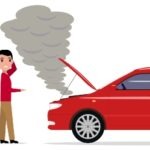
14 Aug An Overheating Engine? What Are The 7 Common Reasons?
 Sometimes during the peak of summer, it can be difficult to determine if your car is overheating or just ‘running hot’ because the outside temperature is unbearable. Believe it or not, our bodies feel the heat much more acutely than our cars do. If the temperature gauge on your dashboard is rising, you need to pay attention. Many things, including coolant issues and water pump or cooling fan malfunctions, can cause an overheating engine. If you want to avoid expensive repairs, schedule a service with your auto technician as soon as you notice your car overheating.
Sometimes during the peak of summer, it can be difficult to determine if your car is overheating or just ‘running hot’ because the outside temperature is unbearable. Believe it or not, our bodies feel the heat much more acutely than our cars do. If the temperature gauge on your dashboard is rising, you need to pay attention. Many things, including coolant issues and water pump or cooling fan malfunctions, can cause an overheating engine. If you want to avoid expensive repairs, schedule a service with your auto technician as soon as you notice your car overheating.
What Causes An Overheating Engine?
A car’s engine can overheat for several reasons. It’s important to note that a small malfunction with a single component can snowball into a domino effect situation if not resolved quickly. Never ignore an overheating engine. If any dashboard warning lights illuminate, and you can see the temperature gauge moving into the danger zone, you must immediately address the issue. Not sure where to start? Let’s look at several reasons that cause an overheating engine.
1. Broken Cooling Fan
Most newer vehicles use a small electric motor to operate the radiator cooling fan. The fan turns on and off while driving to maintain the engine’s temperature. Occasionally, the fan blades can crack or break, reducing the fan’s cooling capability. The electric motor, fuse, or sensors used to control the fan can also fail. If the cooling fan doesn’t turn on when needed, your car’s engine can quickly overheat.
2. Clogged Radiator
Radiator interiors can get clogged with debris or sediment from old coolant, which greatly reduces their ability to move heat away from the engine. The radiator’s exterior can also get dirty, which prevents heat from releasing into the air. A clean radiator is vital for preventing an overheating engine.
3. Coolant Issues
Coolant is usually a mixture of 50% antifreeze and 50% distilled water. Using tap water can introduce minerals and other impurities into your vehicle’s cooling system, making your coolant less effective. Always use the factory-recommended antifreeze type in your car, in the correct ratio. Check the coolant levels once a month to make sure the overflow reservoir is full.
4. Faulty Water Pump
The water pump circulates coolant through the engine’s cooling system. A dying pump often produces a whirring or whining sound. A faulty water pump is pretty common in vehicles with over 100,000 miles.
5. Loose Drive Belts
Most vehicles use drive belts to operate radiator cooling fans and to power the water pump. A loose, damaged, or worn-out drive belt can slip or even come off the pulley operating the various cooling system components. Loose drive belts can easily cause an overheating engine.
6. Low or Dirty Oil
Low or dirty oil cannot properly lubricate internal engine parts, which increases friction and heat production. Clean engine oil can reduce transfer away about 40% of the heat generated by a running engine.
7. Malfunctioning Thermostat
Thermostats maintain your engine’s optimal temperature. A malfunctioning thermostat prevents coolant from circulating through the engine block. A thermostat can wear out over time or be damaged from corrosion. Damaged thermostats may create boiling, bubbling, or grumbling sounds. Some vehicle models have two thermostats. Read your owner’s manual for more detailed information about your specific vehicle.
Troubleshooting Tips
There can be many, many issues that can contribute to an overheating engine. Below are five maintenance tasks that you can perform to help mitigate expensive repairs.
- Clean Radiator Fins: Remove leaves, dirt, and other debris from the exterior radiator surface. Since it is usually located directly behind the front grill, the narrow slots between the cooling fins can get damaged or clogged with debris. Use a vacuum to remove any dirt and a flat screwdriver or other device to gently straighten bent fins.
- Coolant Flush or Fill: The main function of coolant is to absorb heat. Once the chemical additives in the coolant break down, its heat-absorbing properties are less effective. Additionally, sediment can build up within the cooling system, clogging the radiator and other components, restricting the flow of coolant. Fresh coolant every five years or 100,000 miles maintains proper engine temperature and prevents corrosion within the cooling system.
- Inspect Radiator Cap: Your cooling system works under pressure. If it doesn’t maintain a significant amount of pressure, you may have a leaking radiator cap.
- New Air Filters: Your vehicle’s engine requires huge amounts of air for proper combustion. When airflow is restricted, your engine works harder, which can increase heat production.
- Regular Oil Changes: Low oil levels or old, compromised oil cannot effectively cool your engine. During an oil change, the technician will also replace the oil filter. A clogged filter can significantly restrict oil flow, which can also contribute to an overheating engine.
JJ’s Auto Care & Repairs in Jacksonville, FL
Maintaining proper coolant and engine oil levels is important for preventing an overheating engine. But those factors are really just the tip of the iceberg. If your thermostat gauge is in the red or you smell burning fluids, it’s time to bring your vehicle into JJ’s Auto Care. Our technicians will perform a thorough diagnostic inspection to determine why your vehicle’s engine is overheating and repair or replace the damaged components (like the water pump or cooling fan).
Schedule An Overheating Engine Appointment
Contact us today by phone (904) 721-6646 or online to schedule an auto repair appointment. You can count on us for an honest and reliable diagnosis of your vehicle’s problems, plus quality repairs.

